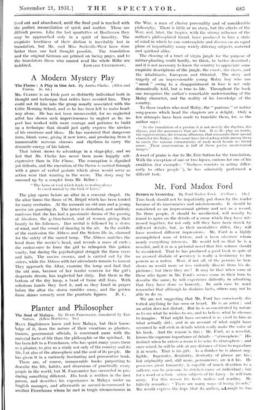Planter and Philosopher
The Soul of Malaya. By Henri Fauconnier, translated by Erie Sutton. (Elkin Matthews. 9s.) MANY Englishmen know and love Malaya, but their know- ledge of it, from the nature of their vocations as planters, traders, government officials, is concerned more with the material facts of life than the philosophic or the spiritual. It has been left to a Frenchman, who has spent many years there as a planter, to give us a study not only of the country and its life, tut also of the atmosphere and the soul of its people. He has given, Win a curiously fascinating and provocative book.
There are, of course, innumerable books purporting to describe the life, habits, and diversions of practically every people in the world, but M. Fauconnicr has succeeded in pro- ducing something different. His book is written in the first person, and describes his experiences in Malaya under an English manager, and afterwards as second-in-command to another Frenchman whom he met in tragic circumstances in the War, a man of elusive personality and of considerable philosophy. There is little or no story, but the effects of the War, and, later, the tropics, with the strong influence of the author's philosophical friend, have produced in him a state of mind in which he can contemplate and discuss on an equal plane of impartiality ninny widely differing subjects, material and spiritual alike.
The clearing of a tract of virgin jungle for the purpose of rubber-planting could hardly, we think, be better described ; and it is not necessary to know the country to appreciate some exquisite descriptions of the jungle, the coasts, the rivers, and the inhabitants, European and Oriental. The shay and tragedy of an impressionable young Malay boy who ran amok " owing to a disappointment in love is nut only dramatically- told, but is true to life. Throughout the book one recognizes the author's remarkable understanding of the Malay character, and the reality of his knowledge of the country.
- To those readers who read Malay, the " Foam's " or native song-poems which head the chapters are a delight. Only a few attempts have been made to translate them, for, as the author says :
" lu the translation of a panttm it is not merely the rhythm, the rhyme, and the assonances that are lost.. It is th:, Play on words, the equivocations, the tenuous allusions, that constitute their special charm for the Malay-8. One must have lived a long while among them to catch the various connotations of each word beside its literal sense. Their conversation is full of these poetic insubstantial images."
A word of praise is due to Mr. Eric Sutton for the translation. With the exception of one or two lapses, curious for one of his erudition (for example: **Madness consists in acting differ- ently to other people '), he has admirably performed a difficult task.
































































 Previous page
Previous page